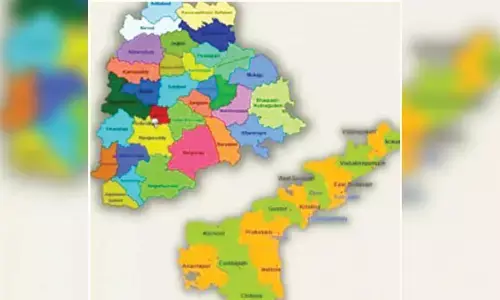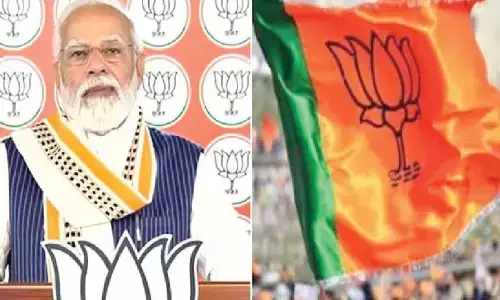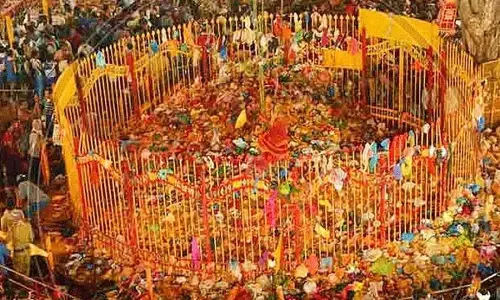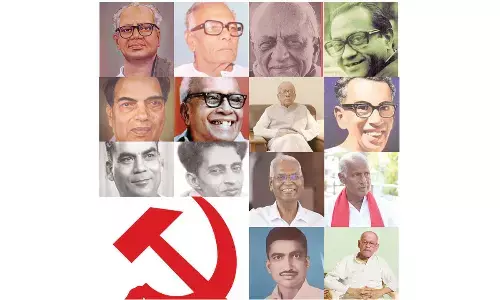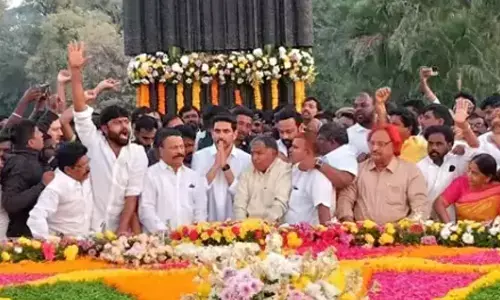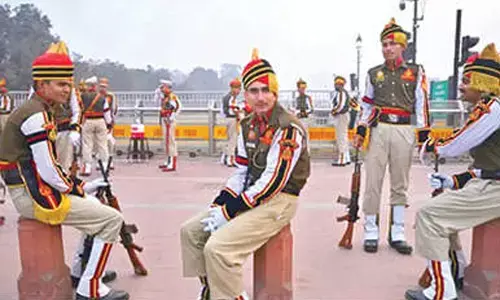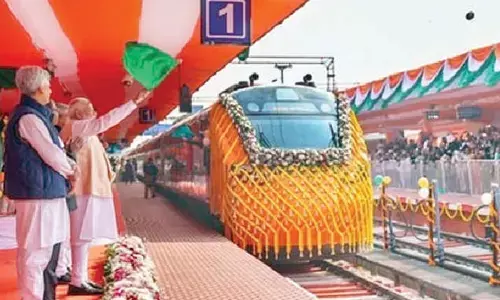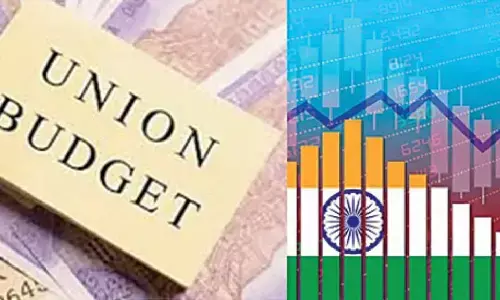Mother, son & the unholy ghost?

It may not, after all, be a Rahul versus Modi fight in 2014. Sonia Gandhi might prefer to continue with Manmohan Singh even for a third term, if there is one. Of the two general secretaries of the AICC who commented on the desirability or otherwise of persisting with the same model of twin centres of authority, Manmohan Singh as Prime Minister and Sonia Gandhi as Congress President in future, Digvijay Singh is an incorrigible optimist and diehard supporter of the First Family.
Called Diggy Raja in political and social circles, the former Chief Minister of Madhya Pradesh is a gladiator who entertains the political animals constantly with his own style of passing provocative remarks on various issues under the Sun tailored to attract attention of the media. He has been behaving like an uncle who is a caretaker of Rahul, arguing in favour of the latter taking over both the important posts of Prime Minister and Congress President. Janardan Dwivedi, on the other hand, is a professional politician who represents, as a spokesman of the party, the opinion of the AICC and its President.
Digvijay may air his personal opinion on any subject with impunity. Janardan cannot. Whatever he says becomes official. Both of them may have expressed their views to maintain a sort of balance or a state of tentativeness on the question of who the future Prime Minister would be if the Congress had its way. At a time when the BJP has made bold to almost announce its prime ministerial face, the Congress seems to be dithering over naming Rahul, preferring, instead, a tentative mode.
The debate on the third term for Manmohan Singh started when he answered a question from a reporter on board the special plane when the Prime Minister was returning from Durban after participating in the BRICS conference. The question was about his view on going for the third term. Singh dismissed the question as hypothetical, saying that he would cross the bridge when he reached there. The inference by the media was that Singh was not disinterested in a third term. Meanwhile, Digvijay gave an interview to News X, a TV Channel, in which he opined, "Personally, I feel that this model has not worked very well. Because� there should not be two power centres. And I think whoever is the Prime Minister must have the authority to function, although Sonia Gandhi has really never interfered in the functioning of the government."
This question of dual power centres has been debated almost throughout the nine years of UPA government. Sonia has been described as the most powerful figure in the country. Manmohan Singh may be Prime Minister, but she has more clout overseeing the ruling coalition and the make-up of the Cabinet and influencing policy. Even when India and Italy traded bitter charges, Sonia's loyalty to India was never questioned. Standard and Poor's recent report headlined, "Will India be the first BRIC Fallen angel?" said, "The division of roles between a politically powerful Congress party President(Sonia Gandhi) who can take credit for the party's two recent national election victories, and an appointed Prime Minister (Manmohan Singh), has weakened the framework for making economic policy, in our view."
Sonia, who has completed 15 years as Congress President, has been the "glue" that keeps not only the Congress but also the UPA together. Sonia, who was rumoured to have undergone surgery at a New York hospital for cancer, looks healthy and energetic. She looks fit to run the party for some more time without passing on the baton to her son. Rahul may take over a Prime Minister if he is interested. The twin centres of power then would be controlled by mother and son which completes the image of a family business.
In case Sonia wants to retire and make Rahul the party president, there are a few ambitious leaders in the Congress who would like to be Rahul's Manmohan Singhs. A chubby-cheeked, bespectacled gentleman clad in angavastram sporting a self-satisfied feline smile is prominent among the aspirants. But it is very difficult for Sonia to get another non-political leader with the stature of Manmohan Singh.
It is not out of any conviction that the family should not perpetuate itself directly in power (by taking on the role of Prime Minister) that the Congress might opt for the same team yet again. It is rather a sense of realism and unemotional assessment of the strengths and weaknesses of the middle-aged scion of Nehru-Gandhi dynasty, whose only strong point is considered to be his name, that might have persuaded Sonia Gandhi not to burden her son with responsibilities that he is not capable of discharging. She does not want to jeopardize the chances of the Congress in the 2014 polls.
Let us accept the reality that Rahul is not Rajiv. Though Rajiv Gandhi was reluctant to take the plunge, the death of his younger brother forced him to enter politics and the assassination of his mother catapulted him into the PM's chair. Once in politics, Rajiv took his job seriously and went about it as earnestly as possible. His candid speech at the Mumbai AICC about the welfare programmes failing to benefit the target groups is often quoted to show that he was honest to the core.
He spent many sleepless nights sitting with the young leaders of Assam Gana Parishad to sort out the political crisis in the North-Eastern State. He did excellent work in preparing the two Bills (Panchayati Raj and Nagara Palika), intended to reinvigorate the local bodies by injecting a fresh dose of democratic spirit, that led to landmark amendments to the Constitution. Right or wrong, he took bold decisions and implemented them, be it sending IPKF to Jaffna or mouthing invectives in utterly native idiom like "Naani yaad diladenge" during Haryana Assembly elections, exhibiting the temperament and reflexes of a pugilist.
But for the Bofors scandal and the decision to allow 'shilaanyaas' at Ayodhya, which 'soft Hindutva' line had led to demolition of Babri Masjid during the rule of PV Narasimha Rao, who was derisively described by Congress leaders themselves as the first BJP Prime Minister of the country, there was nothing to fault Rajiv with. He led the party and the government from the front.
Indira Gandhi, the other illustrious dynast, was more energetic and aggressive than Rajiv. Both of them believed in themselves and remained a single centre of power by doubling up as PM and Congress President. Sonia too would have loved to do the same but for that inexplicable decision, shrouded in mystery, to become a symbol of sacrifice. Dr Abdul Kalam, the then President of India, would not divulge the details.
Jawaharlal Nehru could not get along with Purushotham Das Tandon and insisted on the latter's resignation. Indira had party presidents like Barooah whose slogan was "Indira is India". When she was confronted with Nijalingappa and then Kasu Brahmananda Reddy, she split the party. PV did not invite Sonia to take charge as party president despite repeated public reminders from Arjun Singh, another Thakur and dynasty-loyalist from Madhya Pradesh.
When Sonia could not take the reins of office as Prime Minister, she had to settle for party president and look for someone who was trustworthy and unassuming to handle the executive position. That PV's Finance Minister filled the bill is history. The duo have been sailing together through thick and thin, surviving many a crisis. Sonia would have loved to retire after serving the party and the country for so long and take a well-deserved rest had her son been forthcoming to don the mantle. Rahul has obviously disappointed her.
Compare Rahul with his father or grandmother. He does not seem to believe in himself. He has been indecisive in his personal life as well as political career. In spite of enjoying power without responsibility for nine long years as an MP and son of the ruling deity, Rahul is yet to give the people of his country an impression that he has the ability to think coherently and act decisively on any one of its myriad problems. He does not look like a confidant politician who gives confidence to his followers. He never took up any issue head on.Even in his attempt to recapture some of the glory for the Congress in UP where he campaigned vigorously in last year's Assembly elections, he came a cropper.
He fights shy of speaking out his mind in Parliament on any of the burning issues and goes on holiday in Europe when the country is burning. The image that comes across is that of a non-serious prince who is unable to focus on matters of critical importance. We were not given any clue about his templates, leave alone the narrative. What kind of software he has? Sonia Gandhi, more than anyone else, knows the limitations of her son. She has been extra cautious in accomplishing her life's mission of putting Rahul on the throne.
She gave vent to her frustration when she told the media that "it is ultimately for Rahul to take a decision." Her problem probably is that Rahul has been refusing or unable to take a decision she is waiting for. Even when she tried to impose her decision by entrusting responsibility, he was found wanting. Take, for instance, Rahul's oft-repeated faith in internal democracy and the need to reduce the role of the high command in decision-making at the State level. After all the tall talk he, in his capacity as vice-president of the party, appointed CM Ibrahim, a rank outsider, as PCC president in Karnataka, a few weeks before Assembly elections. This single act of Rahul strengthens the argument that he does not mean what he says. Worse, he does not remember what he promises. It was not the case with Rajiv.
Contrast Rahul with Narendra Modi. The Gujarat Chief Minister's belief in himself borders on arrogance. He has solid accomplishments to show for his tenure. He has a vision of his own. It is a different matter that many in this country don't entirely agree with his philosophy.
Modi is ambitious and irresistible. He is articulate. He is an acknowledged fighter who led many a battle and emerged victorious. He insists on being seen as leading the march. The Congress led by Rahul Gandhi may not be able to stop him although the BJP leader would be driving the minorities back to the Congress fold by his very presence at the helm. The gush over Modi which was visible in the recent party conclave at Talkatora Stadium in New Delhi was more intensive and striking compared to the clamour for Rahul at the Congress meet in Jaipur.
Rahul cannot match Modi in guts and wits. That may be the reason why the idea of betting again on Sonia-Manmohan model has been catching up. Digvijay, who is more loyal than the king himself, would not give up.
At a time when the BJP has made bold to almost announce its prime ministerial face, the Congress seems to be dithering over naming Rahul, preferring, instead, a tentative mode



